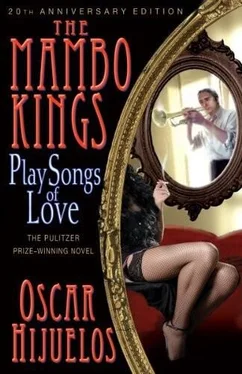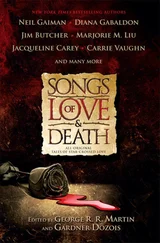They formed a mambo band; that is, a traditional Latin dance band given balls by saxophones and horns. This orchestra consisted of a flute, violin, piano, sax, two trumpets, two drummers, one playing an American kit and the other a battery of congas. Cesar had thought up the Mambo Kings while looking through the advertising pages of the Brooklyn Herald, where half the orchestras had names like the Mambo Devils, Romero and the Hot Rumba Orchestra, Mambo Pete and His Caribbean Crooners. There was a certain Eddie Reyes King of the Bronx Mambo, Juan Valentino and His Mad Mambo Rompers, Vic Caruso and His Little Italy Mambonairs, and groups like the Havana Casino Orchestra, the Havana Melody Band, the Havana Dance Orchestra. Those same pages advertising DANCING LESSONS NOW! LEARN THE MAMBO, THE FOX-TROT, THE RUMBA. DANCE YOUR WAY INTO A GIRL’S HEART! Why not Cesar Castillo and the Mambo Kings?
Although Cesar considered himself a singer, he was also quite talented as an instrumentalist and adept at percussion. He was blessed with tremendous energy, a surge of power from too many slaps in the face from his foul-tempered father, Pedro Castillo, and a love of melody because of his mother and the affectionate maid who had helped bring him into the world, Genebria. (Here he listens to a distant trumpeting on a Mambo King recording, “Twilight in Havana,” and sighs; it’s as if he’s a kid again running through the center of Las Piñas at carnival and the porches of the houses are lit with huge lanterns and the balconies garlanded with ribbons and tapers and flowers, and past so many musicians, musicians everywhere on the street corners, on the church steps, on the porches of the houses, and continuing on toward the plaza, where the big orchestra’s set up; that’s the trumpet he hears echoing in the arcades of his town as he passes the columns and the shadows of couples hidden behind them and charges down steps beyond a garden, through the crowds and the dancers, to the bandstand, where that trumpet player, obese in a white suit, head tilted back, blows his music into the sky, and this carries and bounces off the walls of another arcade in Havana, and Cesar’s blowing the trumpet now at three in the morning, reeling around in circles and laughing after a night out at the clubs and brothels with friends and his brother, laughing with the notes that whip into the empty dark spaces and bounce back, swirling inside him like youth.)
He and his brother actually preferred the slower ballads and boleros, but they set out with Montoya to build a sound dance band, because that’s what the people wanted. It was Montoya who did all the arrangements of pieces like “Tu Felicidad, ” “Cachita, ” “No Te Importe Saber, ” pieces made popular by the likes of René Touzet, Noro Morales, José Fajardo. He knew how to read music, which the brothers had never really learned — though they could struggle their way through a chart, they presented their songs with simple chords and with the melodies worked out on instruments or in their heads. This sometimes annoyed the other musicians, but Cesar used to tell them, “What I’m interested in is a man who can really feel the music, instead of someone who can only play the charts.” And then he talked about the immortal conguero Chano Pozo, who was shot to death in 1948 over a drug deal* and whose ghost was already turning up in Havana mambos, and of musicians like the great Mongo Santamaría. “Just look at Mongo,” Cesar would say to Nestor. “He doesn’t read. And did Chano? No, hombre, he had the spirit, and that’s what we want, too.”
They’d rehearse in the living room of their cousin Pablo’s apartment, on days when the walls were subject to wild fits of clanking boiler pipes and when the floors rumbled because of the subways, as if in an earthquake. They’d rehearse on days when the boiler had shut down and it was so cold steam oozed out of their cuticles and the musicians would roll their eyes, saying, “Who needs this shit?” But they continued because Cesar Castillo treated them well: they’d show up dead-tired from their day jobs and play their hearts out, knowing that at the end of the rehearsal they would crowd into the little kitchen: Pablo’s wife would cook up big platters of steak and pork chops — smuggled out of the meat-packing plant under shirts and long coats — rice and beans, and whatever else they wanted. Having consumed great quantities of food and beer, they’d laugh and head back into the chilly universe feeling as if Cesar Castillo and his brother had really looked out for them.
Hands moving around in circles (after taking a sip of beer, drag of a Chesterfield), he’d explain his ideas about a song: “For this ballad, we should come in quietly like cats. Miguel, first you on the piano, the minor chords and all that business on the high notes, then, Manny, you come in with the bass, but suavecito, suavecito, and then, Nestor, you come in with the horn, talatalatalata, then the congas and the other brass. We go through one verse and then we come into the turnaround and I’ll sing the verse.”
“We’ll play,” Manny the bassist was saying. “And you sing with that priestly expression on your face.”
When they finally had the songs worked out, lyrics and simple chords, the melody lines memorized, he used to take them to his arranger, the elegant Miguel Montoya. Sitting down beside him, he’d whistle the melody or pick it out directly on the piano, so that it could be written down as music. Many a night, passersby on Broadway and Tiemann Place would hear these melodies being worked out by the Mambo King and his brother. People would look up and see their silhouettes in the window, heads arched back. Or sometimes they went up to the rooftop with a few bottles of beer and steak sandwiches on Italian bread, smothered in onions and salt, and set out a blanket, feasted and drank, passing the night improvising songs as if for the red-yellow-blue-and-white-lit buildings of the city.
Jobs were hard to find at first, with so many good dance bands already out there. On his days off, Cesar did a lot of the footwork, going from club to club on Eighth, Ninth, and Tenth Avenues, and to the Bronx and Brooklyn and uptown, Harlem. He was always trying to set up auditions with jaded, tan-suited Puerto Rican gangsters who owned half of the mambo singers in New York. But they did get some jobs: parish dances, grammar-school parties, weddings. Many hours of rehearsal, few dollars of pay. It would help a lot that Cesar Castillo was a white Cuban bolero singer like Desi Arnaz, what they called in those days a Latin-lover type, dark-haired and dark-featured, his skin being what was then called “swarthy.” Swarthy to Americans, but light-skinned when compared to many of his friends. Pito, a wiry Cuban from Cienfuegos, was as dark as the mahogany legs of the easy chair in their living room on La Salle. A lot of the fellows who turned up at the apartment with their squealing, guitar-shaped wives and girlfriends were dark, bony-limbed men.
A flier from May 15, 1950:
The Friendship Club on 79th Street and Broadway presents for your dancing pleasure a double bill of top Mambo Entertainment. Tonight and tomorrow night (Fri. and Sat.) we are proud to present the Glorious Gloria Parker and Her All-Girl Rumba Orchestra! And, sharing this bill, the Fabulous Cesar Castillo and His Mambo Kings of Cuba! Admission $1.04. Doors open at 9P.M. No zoot suits and no jitterbugs, please.
They started playing jobs all over the city. The Café Society on 58th Street, the Havana Madrid on Broadway and 51st, the Biltmore Ballroom on Church and Flatbush, the Club 78, the Stardust on Boston Road in the Bronx, the Pan-American Club and the Gayheart Ballroom on Nostrand Avenue, the Hotel Manhattan Towers on 76th Street and at the City Center Casino.
Читать дальше












